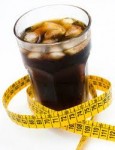 Who doesn't like something sweet like a cupcake? But how much is too much? Our bodies need one type of sugar: glucose! It's an important source of fuel for the body.
Who doesn't like something sweet like a cupcake? But how much is too much? Our bodies need one type of sugar: glucose! It's an important source of fuel for the body.
You don't have to add glucose to your diet because your body can make it by breaking down food molecules from carbohydrates, proteins and fat. Most of the sugars we consume are not just those that occur naturally in food (e.g., fruits, vegetable, and milk). That would be okay. Unfortunately, about 15% of the calories we eat come from sugars added during the processing or preparation of food. Added sugars can make your diet high in calories without any health benefits---adding weight but not essential nutrients. The leading sources of unhealthy sugars are from soda, energy drinks, and sports drinks.
Over time, excess sweeteners can lead to poorer health especially in the form of obesity and cardiovascular problems.
So, are artificial sweeteners a healthy substitute? To date, researchers have found no clear evidence that any approved sweeteners in the U.S. cause cancer or other serious problems. The evidence on whether or not they help with weight loss is mixed. While some people lose weight when substituting sweeteners for real sugar, the effect is usually short term, with weight creeping back on over time.
Researchers are exploring whether artificial sweeteners can affect healthy microbes in the gut and whether they alter the body's ability to use glucose. Other researchers are studying the effect of sweeteners on the brain's reward circuitry which may lead to the intensity of a sweet which leads to a higher craving for sweets. More to come on these studies!
Most experts agree that the key to good health is a well-balanced diet with a variety of natural foods and plenty of exercise. Some suggestions for cutting unneeded sugar:
- Drink water, fat free milk, unsweetened tea/coffee instead of sodas, sports drinks, energy drinks and fruit drinks.
- Reduce sugar in recipes (add 2/3 c instead of 1 c sugar)
- Enhance flavor by using vanilla, cinnamon, nutmeg, etc.
- Eat fresh, canned, frozen and dried fruit without added sugar.
- Use fruit to top cereal, pancakes, and toast instead of syrup, jam or sweet toppings
- Pick foods with no or low sugar (read labels)
Source: NIH News in Health

 A new study from France suggests that women who drink large amounts of diet soda are at increased risk for type 2 diabetes. The findings also support the previously documented association between high intake of regular sugar-sweetened beverages and the condition, report Guy Fagherazzi, from the Center for Research in Epidemiology and Population Health, Villejuif, France, and colleagues in a study
A new study from France suggests that women who drink large amounts of diet soda are at increased risk for type 2 diabetes. The findings also support the previously documented association between high intake of regular sugar-sweetened beverages and the condition, report Guy Fagherazzi, from the Center for Research in Epidemiology and Population Health, Villejuif, France, and colleagues in a study